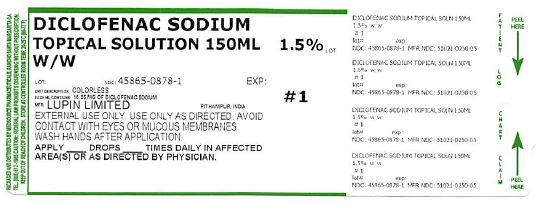
Diclofenac Sodium Solution/ Drops while Breastfeeding
What is Diclofenac Sodium Solution/ Drops used for?
Diclofenac Sodium Solution/ Drops while breastfeeding safe or not? Can there be any side effects for infant while using it during breastfeeding?

8.3 Nursing Mothers It is not known whether this drug is excreted in human milk; however, there is a case report in the literature indicating that diclofenac can be detected at low levels in breast milk. Because many drugs are excreted in human milk and because of the potential for serious adverse reactions in nursing infants from diclofenac sodium topical solution, a decision should be made whether to discontinue nursing or to discontinue the drug, taking into account the importance of the drug to the mother.
Diclofenac Sodium Solution/ Drops Breastfeeding Analsys
Diclofenac sodium while Breastfeeding
SafeCAS Number: 15307-86-5
High plasma protein binding makes excretion into breast milk to be very low. Because the latter and a rapid elimination rate it is considered to be compatible with breastfeeding.
Diclofenac Sodium Solution/ Drops Breastfeeding Analsys - 2
Diclofenac sodium while Breastfeeding
CAS Number: 15307-86-5
Data on excretion of diclofenac into milk are poor, but the drug has a short half-life and little glucuronide metabolite formation. Most reviewers consider diclofenac to be acceptable during breastfeeding.[1][2][3][4] Other agents having more published information may be preferred, especially while nursing a newborn or preterm infant. Maternal use of diclofenac eye drops would not be expected to cause any adverse effects in breastfed infants. To substantially diminish the amount of drug that reaches the breastmilk after using eye drops, place pressure over the tear duct by the corner of the eye for 1 minute or more, then remove the excess solution with an absorbent tissue.
What should I do if already breastfed my kid after using Diclofenac Sodium Solution/ Drops?
It is always a good idea to keep your healthcare provider or doctor informed about your drug usage during pregnancy and breastfeeding but if you have not informed your doctor about Diclofenac Sodium Solution/ Drops and have used it then do not panic as Diclofenac Sodium Solution/ Drops is mostly safe in breastfeeding and should not cause any harm to your baby.
I am nursing mother and my doctor has suggested me to use Diclofenac Sodium Solution/ Drops, is it safe?
Definitely, Diclofenac Sodium Solution/ Drops is safe in lactation for baby. No wonder your doctor has recommended it.
If I am using Diclofenac Sodium Solution/ Drops, will my baby need extra monitoring?
No extra baby monitoring required while mother is using Diclofenac Sodium Solution/ Drops
Who can I talk to if I have questions about usage of Diclofenac Sodium Solution/ Drops in breastfeeding?
US
National Womens Health and Breastfeeding Helpline: 800-994-9662 (TDD 888-220-5446) 9 a.m. and 6 p.m. ET, Monday through Friday
UK
National Breastfeeding Helpline: 0300-100-0212 9.30am to 9.30pm, daily
Association of Breastfeeding Mothers: 0300-330-5453
La Leche League: 0345-120-2918
The Breastfeeding Network supporter line in Bengali and Sylheti: 0300-456-2421
National Childbirth Trust (NCT): 0300-330-0700
Australia
National Breastfeeding Helpline: 1800-686-268 24 hours a day, 7 days a week
Canada
Telehealth Ontario for breastfeeding: 1-866-797-0000 24 hours a day, 7 days a week
